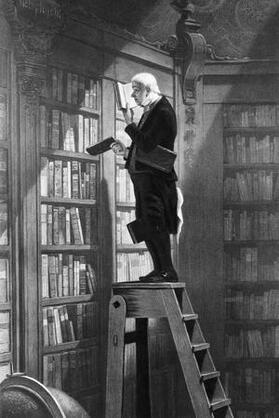 LONDON, ONTARIO – If your house is anything like mine, in trying to accommodate your latest Christmas infusion of printed matter onto your shelves, you’re staring at your packed and buckling bookcases and asking yourself some challenging and even upsetting questions like, “Is there anything here I can part with? What’s the stuff I’ve got to keep, both for reasons of personal enthusiasm and because I want to maintain a coherent representation of the big picture, literature-wise?” May I recommend a handful of books to assist you in this ticklish matter of discernment? (If you don’t want to compound your problem with capacity, perhaps you should see if you can find any of these titles at the library.) About a half century ago, a handful of British writers swam against the tides of specialization, academicism and politicization – then just beginning their rise towards the suffocating stature they’ve achieved today – and dared to produce sweeping histories or outlines that charted the overall development of literary culture. The first of these that I encountered, taking on the largest canvas of all and therefore not probing so deeply as the others, was prolific novelist and playwright J.B. Priestley’s (1894–1984) Literature and Western Man (1960); an intelligent, non-academic (the word ‘phallocentric’ doesn’t appear once) study of writers from Machiavelli, Montaigne and Cervantes to James Joyce, William Faulkner and Thomas Wolfe. 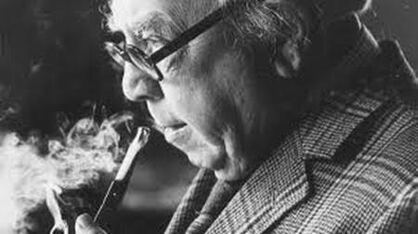 J.B. Priestley (1894–1984) J.B. Priestley (1894–1984) There are other broad literary surveys of this kind written by such worthies as Will Durant and John Cowper Powys but what impresses me so much about Priestley’s opus is the humility and forthrightness of his approach. Published when he was 66 years old and dedicated to Tolstoy’s dictum that any truly great work of art should be assimilable by the average person, this book collects the gleanings of more than five decades of omnivorous and wide-ranging reading. Priestley may not pronounce the last word on any of his subjects but he does a wonderful job of displaying the full array of what’s out there and giving you a sense of its distinctive flavour. I first read this book in my teens and still consider it an ideal road map to pass along to any young person with an affinity for reading. About ten years later I read Richard Hoggart’s (1918–2014) study, The Uses of Literacy: Aspects of Working-Class Life with Special Reference to Publications and Entertainments (1959). The only one of these generalisers with professional academic affiliation (at the University of Hull), Hoggart felt compelled to fold in some pretty arid sociological data to supposedly bolster his findings. But the engrossing, often hilarious and alternately heartwarming and appalling core of his book was his personal reflections and observations of his hard scrabble childhood in the north of England. 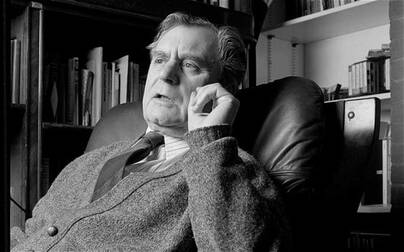 Richard Hoggart (1918–2014) Richard Hoggart (1918–2014) A bright, curious and word-besotted kid, Hoggart quickly outgrew the risible literary fare that was favoured by his family and neighbours; reading material which made no demands and simultaneously stunted their understanding of life and human possibility. He sees how the formulaic and irredeemably lowbrow novels and periodicals that drifted through his family’s house failed to challenge their readers and only reinforced understandings of the world that would keep them stuck at the very lowest rung of the socio-economic ladder. But he also has the honesty to recognize that his kin were rooted to their corner of the world and their community with a bone-deep sense of belonging and even authority that his own sophistication had stripped away and forever placed beyond his reach. By reading widely and ambitiously, Hoggart ate from the tree of knowledge and was expelled from this unlikely Eden of his early life with its cobblestones and tenements and lavatories at the bottom of the garden. Next up was John Gross (1935–2011) whose The Rise and Fall of the Man of Letters: A Study of the Idiosyncratic and the Humane in Modern Literature (1969) was given to me by my preternaturally wise friend, Jeff Cencich (who also introduced me to my main man, G.K. Chesterton, putting his Selected Essays into my hands with the words: “Check this out. I think you’ll like him.”) In this magnificent and engaging survey, Gross examines nearly 200 years of developments in critical journalism, starting out with Francis Jeffrey and Sydney Smith’s launching of the hugely influential Edinburgh Review in 1802 and carrying forward to the Second World War when Cyril Connolly and T.S. Eliot were editing, respectively, Horizon and Criterion. 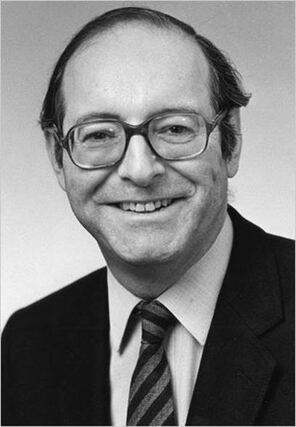 John Gross (1935–2011) John Gross (1935–2011) Whatever the flaws of any of those critical journals may have been, at least they were produced by people who could write and did not have ideological axes to grind. But with the war’s end and the building boom of red brick universities throughout Britain (with their newly expanded syllabuses that included previously shunned units on modern English Lit), control of the literary critical scene largely passed into the hands of academics. Some of these were clearly critics of real distinction (see Hoggart, above or David Cecil at Oxford) but others (most notoriously F.R. Leavis operating out of Cambridge) had exclusionary, censorious and politically partisan agendas that poisoned the field of discourse and helped prepare the way for the hysterically PC anti-culture that chokes the intellectual climate today on so many campuses. In a memorial tribute to John Gross, Geoffrey Wheatcroft wrote that The Rise and Fall was Gross’ great “repudiation of the attempted monopoly of literary criticism by ‘the university’ and the larger academic appropriation of our common culture.” With the rise of the Internet, the horrific pinch being felt by publishers and bookstores everywhere, the atomization of the reading public into disparate cliques and the winnowing of book review space in most newspapers and magazines, I frankly didn’t anticipate that anything was likely to be published anytime soon to supplement that trio of treasures above. So imagine my delighted surprise five years ago to read a profile in The Guardian of novelist, literary biographer and critic D.J. Taylor (b. 1960) which concluded: “He then plans an ‘enormous non-fiction book, which will not earn me much money but I’ve always wanted to write, about English literary culture in the last century. How books are conceived, written, printed, published, reviewed, sold and read.’ He describes it as a ‘continuation and homage’ to John Gross’s magisterial The Rise and Fall of the Man of Letters. ‘And it will end with digital culture and me asking whether there will still be book reviews in the future.’” 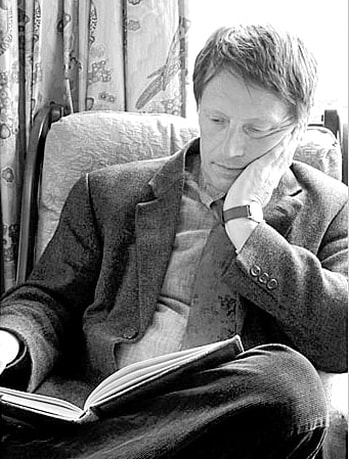 D.J. Taylor D.J. Taylor Taylor’s The Prose Factory: Literary Life in England Since 1918 was published in 2016 and is a sterling – if sobering – addition to this recherché canon. The book shows how at ever shortening intervals throughout the last hundred years, it wasn’t just shifts in popular taste but fundamental changes in how books are made and distributed that would utterly upend the playing field that a generation of writers had adapted themselves to navigate, so that a whole new approach was required to survive. One such rupture was the chaos wrought by the introduction in 1935 of mass market paperbacks. Yes, unprecedented sales suddenly became possible for some writers but the per-unit royalty rate was fractionalized and many top-notch writers of more refined or limited appeal, such as Barbara Pym, were dropped from publishers’ lists altogether as no longer being worth the bother. And in the final decades of the century, any writer who wanted a sustaining career had to cultivate some sort of public image and get out there and dazzle talk show hosts who couldn’t be bothered to read their books; an unthinkably degrading ordeal for souls of a more finely tuned sensitivity such as Penelope Fitzgerald. But 20th century book marketing upheavals such as those were a walk in the park compared to the havoc wreaked by digitization. In describing some writers’ manoeuvres to keep their heads above water, (and his book is packed with financial details such as royalty rates, annual incomes, and reviewing fees; all of which are plummeting for the vast majority of writers in the age of the interwebs) Taylor intermittently recounts tales of the perpetually cash-strapped Hugh Kingsmill (1889–1949), cadging publisher’s advances for books he had little hope – and possibly less intention – of ever actually writing. A Kingsmill aside when writing about Richard Wagner sponging off Mad King Ludwig of Bavaria could almost serve as The Prose Factory’s leitmotiv: “In their financial aspect the lives of most writers, painters and musicians suggest a man leaping from ice floe to ice floe across a wide and rapid river. A strenuous, not a dignified spectacle.” An exquisitely insightful and funny biographer, essayist, novelist and anthologist who was never really able to make a financial go of it, by the end of his days, the ever-buoyant and ingeniously adaptable Kingsmill had nonetheless managed to find publishers for thirty-one volumes (now quite hard to find) of which I’ve attained – and cherish – about half; a considerable monument for such a notorious flounderer to have erected. Needless to say, no Kingsmill titles will be floating out the door in this month’s purge.
1 Comment
Max Lucchesi
7/1/2020 01:00:00 pm
Happy New Year Herman. Your latest post reminds me of when I was just up to high school and we began learning serious poetry. I could never understand why boys were forced to "wander lonely as a cloud", sing to nightingales or sip from Grecian Urns rather than be introduced to Dangerous Dan McGrew and his lady known as Lou, "sink that ship master gunner, sink her split her in twain" or even "into the valley of death rode the six hundred". Poems that might awaken an interest in poetry in the hearts of 12 and 13 year old louts, rather than 'that girly stuff'' which left 'them louts' in fits of giggles. I think your post wasn't for the hopelessly bookish but for the bookish wonks, 'them's that want to be reassured they is reading the right things'. Not that I want to disparage your latest effort, but in this day of dumbing down, you possibly over estimate your readership. Was it Henry Ford who said "One never lost money underestimating the taste of the American public"? We can paraphrase that by saying one will never provide trivia banal enough not to interest the public. By public, ain't no difference any more within the English speaking world. But as a fellow wonk, may I recommend Albert Russell Ascoli's 'Dante and the Making of a Modern Author'. It explores Dante's development from callow youth to the author of the Divine Comedy and his laying, not only the foundation of the Italian language but also to his producing the model and template for Medieval (and possibly modern) authorship.
Reply
Your comment will be posted after it is approved.
Leave a Reply. |
HERMANEUTICS
If you would like to contribute to the ongoing operations of Hermaneutics, there are now a few options available.
ALL LIFE IS A GIFT :
THE IMPORTANCE OF TRADITION :
Archives
June 2024
Categories
|

 RSS Feed
RSS Feed